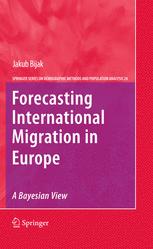

Most ebook files are in PDF format, so you can easily read them using various software such as Foxit Reader or directly on the Google Chrome browser.
Some ebook files are released by publishers in other formats such as .awz, .mobi, .epub, .fb2, etc. You may need to install specific software to read these formats on mobile/PC, such as Calibre.
Please read the tutorial at this link: https://ebookbell.com/faq
We offer FREE conversion to the popular formats you request; however, this may take some time. Therefore, right after payment, please email us, and we will try to provide the service as quickly as possible.
For some exceptional file formats or broken links (if any), please refrain from opening any disputes. Instead, email us first, and we will try to assist within a maximum of 6 hours.
EbookBell Team

4.7
106 reviewsInternational migration is becoming an increasingly important element of contemporary demographic dynamics and yet, due to its high volatility, it remains the most unpredictable element of population change. In Europe, population forecasting is especially difficult because good-quality data on migration are lacking. There is a clear need for reliable methods of predicting migration since population forecasts are indispensable for rational decision making in many areas, including labour markets, social security or spatial planning and organisation. In addressing these issues, this book adopts a Bayesian statistical perspective, which allows for a formal incorporation of expert judgement, while describing uncertainty in a coherent and explicit manner. No prior knowledge of Bayesian statistics is assumed. The outcomes are discussed from the point of view of forecast users (decision makers), with the aim to show the relevance and usefulness of the presented methods in practical applications. “This is a great book that represents a step-change in the forecasting of international migration. Jakub Bijak advocates for the use of Bayesian statistics - a natural way to combine subjective prior information with statistical data. The Bayesian framework provides also a natural way to further develop the migration forecasting process that is ultimately aimed at accounting for and reducing the different uncertainties, and that involves cognitive agents with different expertise - migration experts, population forecasters and forecast users - in order to accomplish that aim. The book is a must for everyone interested knowing how migration, especially international, will evolve and respond to changing conditions, events and policies.”